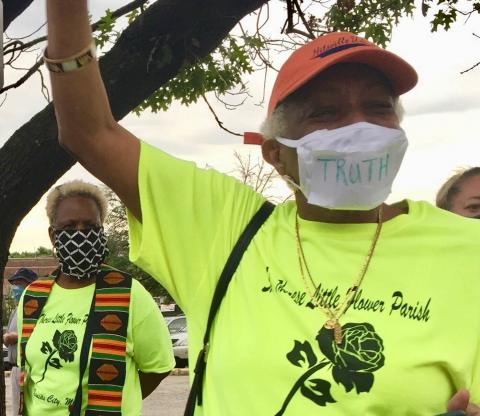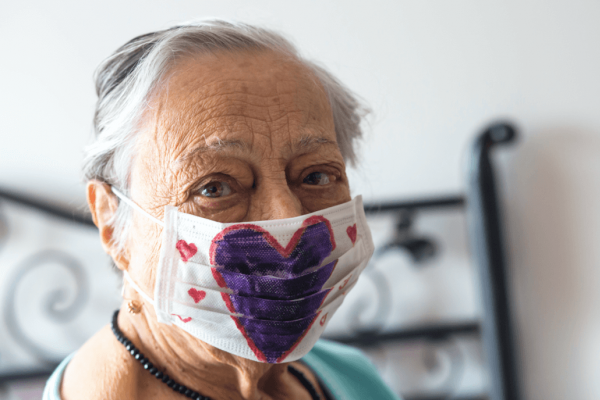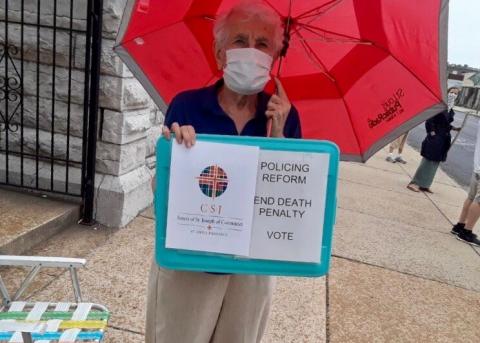In February, Sister Marilyn Lott, 71, retired from her job on the Province Leadership Team and moved into the Nazareth Living Center in St. Louis. Just a few weeks after settling in, the coronavirus hit, forcing residents to bar their doors. Suddenly, Lott found herself alone in her new room and stripped of her ministry work.
“I finished a full time 24/7 job — and then the brakes hit,” she said. “Some days I sit and just kind of stare like ‘what do I do?’ I should be working.”
Founded in 1872 by the Sisters of St. Joseph (CSJs) as a home for ill and retired members, Nazareth found itself among many care facilities making the difficult decision to confine residents to their rooms as the coronavirus tore through the nation in early March. Even with their efforts, the Nazareth community has lost seven sisters and 30 residents in total to COVID-19. In Michigan, 13 Felician Sisters died from the virus at just one convent, 12 in a single month.
My great-aunt, Sister Donna Gunn, 82, is also a resident of Nazareth. Of the sisters lost, she told me: “The hardest part has been their dying and nobody being able to be with them, to remind them what a gift their lives had been.”
Before shutting their doors, the sisters would gather at the room of the deceased and follow the body down the hall to the hearse, praying for her on her way. That ritual is no longer an option. Neither is a burial service.
Now after a sister dies, the group holds prayer services on Zoom to share memories of her life. They also built a website feature that allows family, friends, students, and former co-workers to send messages from the outside.
As the pandemic raged on, the sisters requested special permission from staff to step outside the day a sister dies, with their masks, and sing her off from afar: Roberta, remember us, when you come into the kingdom … they chant, spaced six feet apart.
After softly singing an example over the phone, Gunn paused then said: “The people who don’t wear a mask are the people who haven’t been affected.”
Touched disproportionately by COVID deaths, the sisters keep theirs on.
For sisters in full-time care, the quarantine has presented different challenges. Sister Pat Dunphy, coordinator of the sisters in assisted living, says the hardest part for her residents has been isolation — especially for those without access to technology.
“The lack of socialization has been really hard on the girls,” she said, as most of them went to Mass together every day for decades before churches closed their doors. “They can’t even participate in the Zoom prayer meetings when they don’t have a laptop.”
The assisted living unit previously held frequent “Happy Hour” get-togethers for the nuns to “sit and chit,” a favorite pastime. Those days are gone indefinitely. Yet Dunphy is still doing what she can to provide a semblance of normalcy. Recently, one of the sisters had a special request for her drink of choice: Coors.
“So we brought her a beer,” Dunphy laughed, “and she goes, ‘can I drink it now?’ We told her, ‘You most certainly can, although it is 10 in the morning.”
Across campus in the Memory Care unit, sisters face a more complicated, sometimes frightening dilemma; they have to repeatedly relearn about the crisis and its ramifications.
“They forget what’s happening, and why all these precautions are in place. So we have to keep reminding them,” Gunn says. She said she makes funny cards and comics reminding them of the virus that she then sends to the unit — providing both laughs and recall.
Gunn remembers back to the start of quarantine when a sister injured her back, and pain medication disrupted her memory. “She would say, ‘I have this gift card to take you to dinner. I don’t understand why we can’t go.’” Each day, her friends patiently retold the story of the pandemic, of how the distance came to be.
As the injured sister has healed, she now jokes that she will be 100 by the time they get to use the gift card (she’s 93 now). “This means she has something to really look forward to!” Gunn exclaims. She said they plan on going out for margaritas.
To keep up on the Nazareth tea, the sisters also created email chains — they said word perhaps travels even faster now. They can figure out who’s having a rough time and check in on them: “There are those days where you just want to run away,” said Lott. “Talking to someone else helps.”
The Aging and Evolving Sisters in the U.S.
In the early days of lockdown, Gunn began transcribing recorded oral histories of the sisters’ lives, documenting their ministries. Her own ministry has been a story in itself; she earned a degree in theater and taught at the elementary and high school levels. Then she received a certificate in gerontology and moved to Mississippi, where she worked with the elderly and coordinated Hurricane Katrina relief efforts.
Yet the story of the sisters as a whole is now one of quiet fading, a fact only exacerbated by the pandemic. Even before COVID times, the church experienced a rapid decline in convent numbers throughout the last half-century. Today, the average age of Roman Catholic sisters in the U.S. is close to 80.
“Religious life was often the only place where women could break the glass ceiling,” Gunn says of the early twentieth century. Joining the order provided an opportunity to become university presidents and hospital administrators, to work in places where women were previously invisible. It also offered an alternative to traditional married life, for women who sought social justice work and independence. It was a lifestyle that afforded adventure.
Despite lower numbers within religious orders, Gunn believes the charism will live on with the laity. Once expected to “show up, pay up, and shut up,” laypeople may begin using their own skills and passions to lead.
“I think part of our work now is not to cling to religious life, but to figure out how the best of who we are can be passed on to others,” she said.
She believes part of the answer is not to work within sponsored institutions, which are often predominantly white spaces, but to put energy toward racial justice and immigration rights. This has been one of the focuses of their quarantine ministry — where and how to serve next.
stlfcloseup.jpeg

Gunn noted, “I think the pandemic is moving to second place, with racism once again moving front and center.”
“A lot of us wanted to be out marching for Black Lives Matter,” agreed Lott, who grew up in Ferguson. “But the virus stopped us. Now our whole focus for the next couple years is racial discrimination and what we can do to help dismantle it.”
While they couldn't initially take to the streets, she and other sisters with positions on school boards are helping implement new syllabi with diversified reading, and also hiring more POC faculty. “We’re starting to have these discussions in our online groups,” Lott says.
While the future of the CSJ community is uncertain, Gunn says these days she returns to an epitaph spoken at Catholic funerals: “Life is changed; not ended.”
In the meantime, Lott has been working on her crocheting skills by making masks for those experiencing homelessness in the city. She looks forward to the days she donates platelets at the Red Cross where she knows the medical staff by name.
“Yesterday I was like, ‘Yay! It’s my day to donate platelets.” she said giggling. “This is the other thing — laughter. It’s extremely important.”
Got something to say about what you're reading? We value your feedback!








